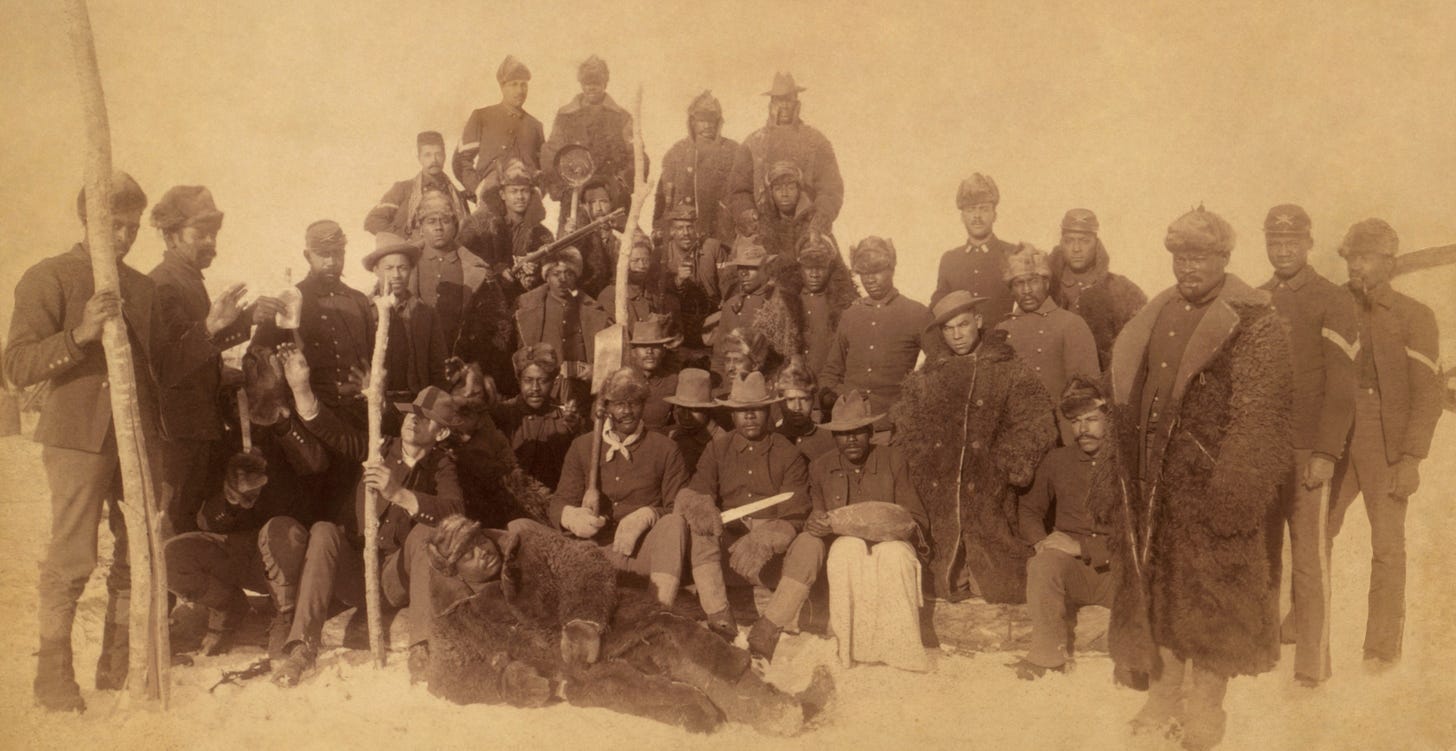‘I Need a Soldier’: On Beyoncé, Buffalo Soldiers and the American Nightmare
How a T-shirt inscription sparked a debate over the roles Black and Indigenous people played in building and surviving this nation.

As Beyoncé continues her triumphant, global reclamation of country music, the cultural manifestation of Black American brilliance and musical genius, fans around the world have draped themselves in the iconography of U.S patriotism.
From the nation’s flag to the bald eagle, the prevailing theme is clear: This nation is ours, and we’re taking back everything white colonizers stole and beat out of us.
This bold, political statement became even more clear when, during a Cowboy Carter tour stop in Paris, she rocked a T-shirt paying homage to the Buffalo Soldiers, the legendary, all-Black military regiments established in 1866 after the Civil War. Their primary purpose was to protect and fight alongside settlers who marched toward the westward expansion of the United States, leaving mangled bodies and destroyed dreams of freedom in their wake.
Expansion is such a subjectively benign word, isn’t it? For many people, it conjures thoughts of freedom and prosperity, obfuscating the reality that during the American Indian Wars, the Buffalo Soldiers, themselves facing rampant discrimination and white supremacist violence, aided and abetted in the policing and massacre of Indigenous people to whom this land rightfully belongs, as well as Mexican revolutionaries who engaged in principled struggle to save their lands from the clutches of U.S empire.
Still, Beyoncé’s Buffalo Soldiers T-shirt, situated as it was within Queen Bey’s glorious, reimagined Western regalia, may have warranted little more than a glance of recognition and Black pride if not for the words — part of a larger description of the Buffalo Soldier — printed across the back:
“Their antagonists were the enemies of peace, order and settlement: warring Indians, bandits, cattle thieves, murderous gunmen, bootleggers, trespassers and Mexican revolutionaries.”
Ancestor Kwame Ture teaches us that "peace is the white man's word; liberation is ours." This is evidenced by the fact that Black soldiers were often attacked by white civilians with impunity. Spiteful white soldiers, terrified by the sight of armed Black men — something President Ronald Reagan would later remedy with the Mulford Act of 1967 — refused to stand in solidarity with them. Further, they were often treated as cannon fodder by their white commanders.
“I did not send for you,” said Maj. Gen. Edward M. “Ned” Almond of the 92nd Infantry (Buffalo) Division. “Your Negro newspapers, Negro politicians, and white friends have insisted on your seeing combat, and I shall see that you get combat and your share of casualties,” Another white officer noted later, “He most certainly kept his word.”
Still, many Buffalo Soldiers, not all (salute to the revolutionary David Fagen), fought to expand the borders of this white settler, colonial project to which they laid claim by subjugating and exterminating so-called “enemies of peace.”
It should come as no surprise, then, that some Indigenous Americans have spoken out against the shirt’s messaging.
“In the 1870s Red River War, [Buffalo Soldiers] assisted the army in removing Comanche and Kiowa people from their homelands,” Troy Littledeer writes in the Times of London. “Two decades later, members of the 9th Cavalry were at Pine Ridge, South Dakota, during the lead-up to the Wounded Knee Massacre, where more than 250 Lakota men, women and children were killed and left in the snow.
“Those weren’t just military engagements,” Littledeer continued. “They were part of a larger federal campaign that stripped Native nations of land and sovereignty. Between 1850 and 1887, two-thirds of Native landholdings were slashed from 150 million acres to 50 million, as the government continued its campaign of slaughter and land grabbing.
“Indeed, history is messy and complex. These Black soldiers were navigating a racist system that gave them limited choices. But the pain their actions caused Native communities still lingers. That’s part of the story, too.”
Let’s make it plain. Yes, history is messy and complex, and Indigenous Americans have played a role in that truth.




